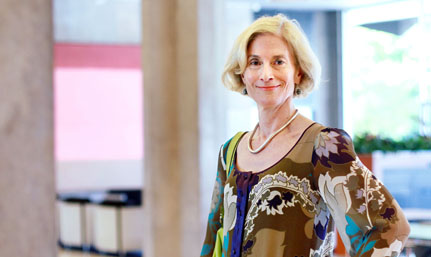Latest News Archive
Please select Category, Year, and then Month to display items
02 January 2025
|
Story Gerda-Marie van Rooyen
|
Photo Supplied
 Leading the research in South Africa is Prof Linus Franke from the Department of Soil, Crop and Climate Sciences.
Leading the research in South Africa is Prof Linus Franke from the Department of Soil, Crop and Climate Sciences.
Scientists are actively pursuing the successful breeding of diploid hybrid potatoes from inbred lines. This is expected to revolutionise potato breeding as it holds the key to rapid genetic progress. It will introduce new varieties for commercialisation through seed. Currently, existing potato variants have a gene that renders self-pollinated seeds infertile.
Prof Linus Franke, an academic in the Department of Soil, Crop and Climate Sciences at the UFS, is leading the research in South Africa. “This technology allows the production of genetically uniform potato seed that is easy to transport and largely disease-free.” He says this differs from conventional breeding whereby only vegetative propagation is possible due to tetraploid varieties in potatoes. It also risks carrying pests and diseases from one generation to the next – leading to the accumulation of pests and diseases with each round of multiplication.
Seed innovation
Prof Franke explains that Solynta BV, a seed company based in the Netherlands that produces potato varieties that can be grown from seed, has included South Africa in their research efforts because it is one of Africa’s largest producers and exporters. Through his academic relationship with Wageningen University and Research, a Dutch institution renowned for its agricultural endeavours and food production, the UFS became involved in researching hybrid potatoes grown from seed.
Diploid seeds containing two sets of chromosomes allow easier gene manipulation to increase predictability and speedier genetic progress. The breeding approach enables the incorporation of tolerance to pests, diseases, abiotic stresses (cold, heat, drought) and other desired genetic traits.
Although Prof Franke is optimistic about this research, he is not blind to disadvantages. “Potato seeds are tiny and have little energy reserves, making it harder to grow potatoes from seed than from tubers.” He says potatoes from seed will take longer to cultivate than tubers, as farmers need to grow plantlets from seeds first, adding six weeks to the growing period. “It is possible that commercial farmers can grow potatoes directly from seed. Alternatively, perhaps more likely, specialised growers will produce tubers of potatoes from seed; these tubers are then sold as seed tubers to other potato farmers, who then continue their normal practices of producing potatoes for the market from tubers.”
Financial benefits
Prof Franke says farmers have reason to get excited. “Seed potatoes will reduce input costs, as varieties with enhanced tolerance to pests and diseases require less pesticides. Planting one hectare of potatoes requires three to four tonnes of potato tubers, but only one 25 g packet of potato seeds.” Since potatoes are a more valuable commodity than maize, this technology might also increase farmers’ income potential.
UFS confers honorary doctorate on one of the world’s foremost academics
2012-11-26
 |
|
Prof. Martha Nussbaum
Photo: Supplied
26 November 2012
|
The University of the Free State (UFS) will confer three honorary doctorates at the Summer graduation ceremony on 6 December 2012. One of the world’s foremost philosophers is among those to be honoured. Prof. Martha Nussbaum, described by The New York Times as “one of the most prominent female philosophers in America”, will be honoured with a D.Litt. degree in the Faculty of Humanities. Judge F.D.J. Brand, a former Constitutional Court judge, and Prof. Otto Walter Prozesky, one of the country’s foremost medical researchers, will also receive honorary doctorates.
Prof. Nussbaum, who has honorary doctorates from 40 colleges and universities in America, Canada, Asia and Europe, is recognised for her intellectual and public contribution to human development. She is the Ernst Freund Distinguished Service Professor of Law and Ethics at the University of Chicago and an active member of the American Philosophy Association. Prof. Nussbaum is well-known and respected as a public intellectual and is considered to be one of the most prominent philosophers in the world.
Prof. Prozesky is to be honoured for the important role that he played in the field of medical research, especially as the President of the Medical Research Council and as researcher/educator in the field of virology and HIV/Aids. He is to receive an honorary degree in Medicine in the Faculty of Health Sciences.
Judge Brand, Extraordinary Professor in Private Law in the Faculty of Law at the UFS, is to receive a Doctor Legum degree in recognition of his considerable contribution to the legal science. More than 120 of his judgments are reported in South African legal reports. A review of recent South African legal journals (over the past five years) shows that reference is made to his judgments in at least 30 articles and case discussions.
The Summer graduation ceremony will be held in the Callie Human Centre on the Bloemfontein Campus and will take place in two ceremonies. At 10:15, master’s degrees and doctorates will be awarded, and at 15:15 qualifications will be awarded in a combined graduation ceremony of the Faculty of Health Sciences and the School of Open Learning.
- Prof. Martha Nussbaum will lead a conversation with members of the public and the campus community on 7 December 2012. On 8 December 2012, she is the main speaker at the UFS’s conference on “Engaging the Other: Empathy and Breaking Transgenerational Cycles of Repetition” on the Bloemfontein Campus.